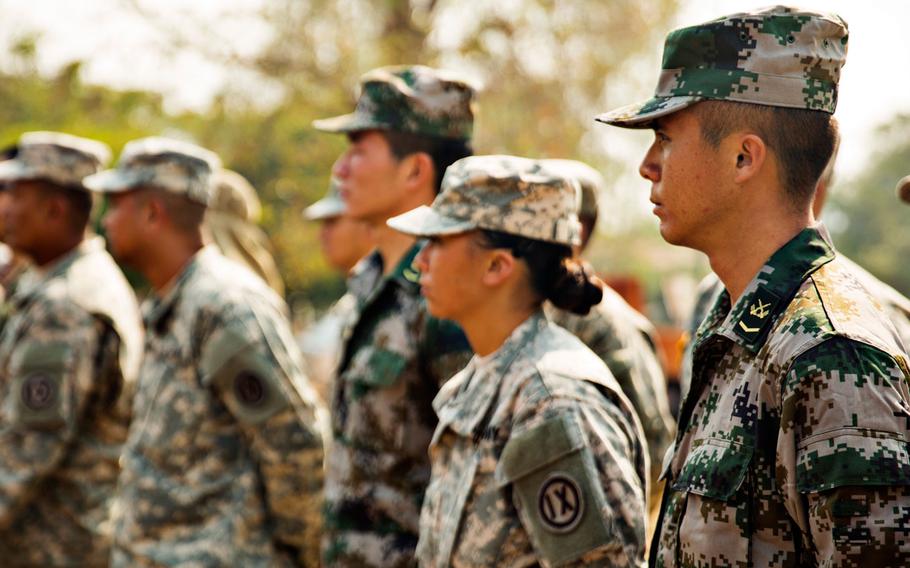
Chinese and U.S. soldiers stand in formation during a ceremony for a new facility at Ban Nhong-Plong Elementary School, located in Chai Badan District, Thailand, Jan. 24, 2015. As part of Exercise Cobra Gold 2015, a combined force of U.S., Chinese and Thai military engineers worked on the building. The structure will serve as a town meeting center and school cafeteria. (James Marchetti/U.S. Marine Corps)
Some 3,600 U.S. servicemembers are participating in Cobra Gold 2015 amid a diplomatic row that could have long-term repercussions on the security picture in Southeast Asia.
The long-running annual exercise, which had its ceremonial kickoff Monday, never seemed to be in doubt despite U.S. concerns over host nation Thailand’s military coup last May.
The U.S. values Thailand’s location and well-equipped bases as strategically critical, while Thailand values access to U.S. tactics and procedures.
This year’s exercise will feature less live-fire and more humanitarian operations, but that won’t bother most of the roughly two dozen participant and observer nations, who desire Cobra Gold largely for the relationships they can forge with each other.
Despite the apparent triumph of pragmatism at Cobra Gold, the strident Thai objections over Assistant Secretary of State Daniel Russel’s critical remarks of the military junta during a visit to Bangkok last month shouldn’t be dismissed as political theater.
Thailand, like many other nations in the region, is determining how to balance its interests between the United States and China, whose interests often diverge over regional security. The recent perceived slight by Russel could slowly push Thailand closer to China’s camp, said Anthony Davis, a Bangkok-based analyst with IHS-Jane’s Military and Security Assessments.
“In a decade or 15 years, this may be seen as a watershed moment in a mutual recalibration of the (U.S.-Thai) relationship, which will entail a downgrading,” Davis said.
Russel bluntly discussed the coup and prosecution of Thailand’s democratically elected government, which the military and political opponents viewed as corrupt, during his Jan. 26 speech at Chulalongkorn University and in a subsequent television interview.
“Ending martial law throughout the country and removing restrictions on freedom of speech and assembly are important steps as part of a genuinely inclusive reform process that reflects the broad diversity of views within the country,” Russel said during his speech.
His comments likely wouldn’t have been taken so harshly had they been made in private, or through a spokesman in Washington. Secretary of State John Kerry and others have criticized the Thai government for crackdowns on protesters and media, book bans and other actions.
However, Thais perceived Russel as an invited guest who criticized his host. Even some Thais opposed to the military coup were angered by his comments, Davis said.
“A loss of face in this country is a cardinal sin … it is hugely important here,” Davis said.
After Russel’s departure, Thai officials summoned the U.S. Embassy’s charge d’affaires to express their displeasure.
Prime Minister Prayuth Chan-ocha, the general who led the coup, called Russel’s comments a big disappointment.
“It saddens me that the United States does not understand the reason why I had to intervene and does not understand the way we work, even though we have been close allies for years,” he told reporters.
Last week, Prayuth pointedly thanked China for understanding how Thailand works.
He met with China Defense Minister Chang Wanquan and announced a new intelligence-sharing agreement, according to media reports.
Wanquan said China had no plans to interfere with the military regime, according to the Bangkok Post.
China and the U.S. are among each other’s most important trading partners. The two nations also engage in limited military exchanges; for example, some of their servicemembers just collaborated on a humanitarian project in Thailand.
However, the two nations have vastly different visions of the future direction of the Asia-Pacific region.
China’s ambiguous claims on nearly 90 percent of the South China Sea conflict with the interpretation of international law accepted by the U.S. and most other nations. Beijing’s claims – backed by threats of force – on islands in the region either administered or claimed by U.S. allies have increased tensions. The decades-long U.S. protection of Taiwan from invasion by China simmers in the background.
Thailand has no territorial squabble with China and stands to benefit from its increasing capabilities. This could lead to a “gradual recalibration” of its security relationships, Davis said.
However, Thailand doesn’t have to choose one side. It gains regional prestige from hosting Cobra Gold and technical help fighting its southern insurgency from the United States, among other benefits. Thailand exported $27 billion in trade to the U.S. last year, a slight increase from 2013.
“This is still a couple that have got a lot in common and (have) spent a lot of time together,” Davis said of the U.S. and Thailand. “I don’t think anybody in any sense is signaling the possibility of divorce.”
slavin.erik@stripes.com Twitter: @eslavin_stripes